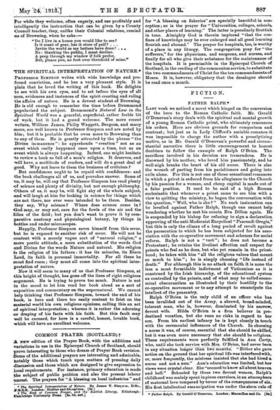COMMON PRAYER (SCOTLAND).}
lk. xrEw edition of the Prayer Book, with• the additions and variations in use in the Episcopal Church of Scotland, should prove interesting to those who dream of Prayer Book revision. Some of the additional prayers are interesting and admirable, notably those which touch upon matters of pressing daily .discussion and those which are designed to give expression to local requirements. For instance, primary education is made -the subject of public petition and also the present labour 'unrest. The prayers for "A blessing on local industries " and
•
• The Spiritual Interpretation of Nature. By James Y. Simi-am, D.Sc., N.B.S.E. London: Hodder and Stoughton. [68.] t The Book of Common Prayer, and the Scottish Liturgy. Edinburgh Cambridge University Press. Cgs. ed. lies.]
for "A blessing on fisheries" are specially beautiful in con. ception ; so is the prayer for " Universities, colleges, schools, and other places of learning." The latter is peculiarly Scottish in tone. Almighty God is therein implored "that the con- fines of knowledge may be ever enlarged and all good learning flourish and abound." The prayer for hospitals, too, is worthy of a place in any liturgy. The congregation pray for " the sufferers," for the physicians, and surgeons, and nurses, and finally for all who give their substance for the maintenance of the hospitals. It is permissible in the Episcopal Church of Scotland, in the reading of the communion service, to substitute the two commandments of Christ for the ten commandments of Moses. It is, however, obligatory that the decalogue should be read once a month.










































 Previous page
Previous page